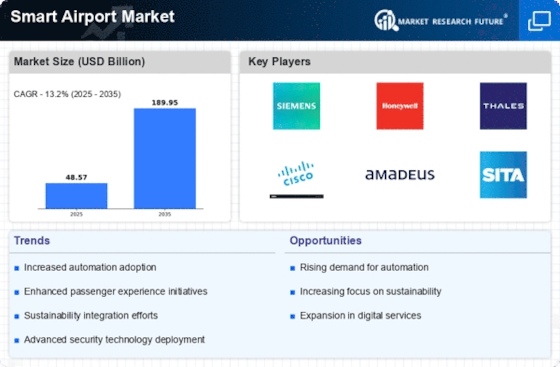Market Analysis
In-depth Analysis of Smart Airport Market Industry Landscape
Several market factors contribute to the dynamic landscape of the Smart Airport market, reflecting the industry's response to evolving technological, economic, and societal trends. One crucial factor is the escalating demand for enhanced passenger experiences. As travelers increasingly seek seamless, personalized, and efficient journeys, airports are compelled to invest in smart technologies that cater to passenger needs. The integration of biometrics, mobile apps, and Artificial Intelligence (AI) ensures a smooth and hassle-free experience, from check-in to boarding, aligning with the growing expectations of modern air travelers.
Get ready for smoother skies and smarter travels! The smart airport market, valued at a cool USD 37.9 billion in 2022, is set to take off at a 13.20% CAGR, reaching a projected peak of USD 90.28 billion by 2030. This supersonic growth is fueled by two main engines: a growing reliance on AI for enhanced security and a skyrocketing number of passengers taking to the skies. Buckle up for faster check-ins, shorter lines, and maybe even robot bartenders serving you cocktails while you wait for your flight – the future of airports is looking bright, efficient, and full of surprises! The relentless drive for operational efficiency is a fundamental market factor shaping the smart airport industry. Airports worldwide are under constant pressure to optimize their processes, reduce costs, and improve overall efficiency. The deployment of automation, robotics, and Internet of Things (IoT) technologies enables airports to streamline operations such as baggage handling, security checks, and maintenance. The pursuit of operational excellence not only enhances the airport's performance but also contributes to cost savings, a critical consideration in the highly competitive aviation sector.
Technological advancements and the pervasive influence of digitalization are instrumental market factors. The rapid evolution of technologies such as AI, IoT, and data analytics empowers airports to create intelligent and connected ecosystems. Smart airports leverage these technologies to collect and analyze vast amounts of data in real-time, providing actionable insights into passenger behavior, operational processes, and security threats. The integration of cutting-edge technologies enables airports to stay ahead in the digital transformation era, driving innovation and competitiveness.
Security considerations play a paramount role in the market factors influencing smart airports. The increasing complexity and diversity of security threats necessitate advanced and adaptive security measures. Smart airports invest in state-of-the-art security technologies, including biometrics, AI-powered surveillance, and threat detection systems, to ensure a robust and resilient security infrastructure. The ability to address evolving security challenges is a critical factor influencing the adoption of smart solutions in airport operations.
Sustainability and environmental consciousness are becoming pivotal factors in the smart airport market. Airports are recognizing the importance of adopting eco-friendly practices to minimize their environmental footprint. Smart energy management systems, solar power generation, and waste recycling initiatives contribute to the industry's broader commitment to sustainable development. The integration of green technologies not only aligns with global environmental goals but also reflects a growing societal expectation for responsible and eco-conscious airport operations.
Globalization and the interconnectedness of air travel contribute to the market factors shaping smart airports. As international travel continues to rise, airports are compelled to enhance their capabilities to handle diverse passenger demographics, varying cultural expectations, and evolving regulatory requirements. The adoption of smart technologies facilitates seamless global travel, addressing the complexities associated with international operations, immigration processes, and cross-border collaborations.
Economic factors, including budget constraints and financial considerations, significantly influence the adoption of smart solutions in airport operations. While airports recognize the long-term benefits of smart technologies, they must navigate financial constraints and ensure a return on investment. The cost-effectiveness of implementing smart solutions becomes a critical factor, influencing the decision-making process for airport operators and stakeholders.
Regulatory frameworks and standards play a crucial role in shaping the smart airport market. Governments and aviation authorities establish guidelines and regulations to ensure the safe and secure implementation of smart technologies in airport operations. Compliance with these standards is essential for airports to maintain operational integrity, adhere to safety protocols, and gain public trust.
The impact of global events, including public health crises such as the COVID-19 pandemic, represents a significant market factor. The pandemic has accelerated the adoption of touchless technologies, health screening measures, and hygiene protocols in smart airports. The industry's responsiveness to unforeseen challenges and its ability to integrate pandemic response measures into smart airport operations highlight the dynamic nature of market factors and the industry's adaptability.


















Leave a Comment